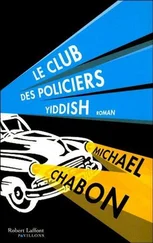Michael Chabon - The Yiddish Policemen's union
Здесь есть возможность читать онлайн «Michael Chabon - The Yiddish Policemen's union» — ознакомительный отрывок электронной книги совершенно бесплатно, а после прочтения отрывка купить полную версию. В некоторых случаях можно слушать аудио, скачать через торрент в формате fb2 и присутствует краткое содержание. Жанр: Альтернативная история, Полицейский детектив, на английском языке. Описание произведения, (предисловие) а так же отзывы посетителей доступны на портале библиотеки ЛибКат.
- Название:The Yiddish Policemen's union
- Автор:
- Жанр:
- Год:неизвестен
- ISBN:нет данных
- Рейтинг книги:5 / 5. Голосов: 1
-
Избранное:Добавить в избранное
- Отзывы:
-
Ваша оценка:
- 100
- 1
- 2
- 3
- 4
- 5
The Yiddish Policemen's union: краткое содержание, описание и аннотация
Предлагаем к чтению аннотацию, описание, краткое содержание или предисловие (зависит от того, что написал сам автор книги «The Yiddish Policemen's union»). Если вы не нашли необходимую информацию о книге — напишите в комментариях, мы постараемся отыскать её.
The Yiddish Policemen's union — читать онлайн ознакомительный отрывок
Ниже представлен текст книги, разбитый по страницам. Система сохранения места последней прочитанной страницы, позволяет с удобством читать онлайн бесплатно книгу «The Yiddish Policemen's union», без необходимости каждый раз заново искать на чём Вы остановились. Поставьте закладку, и сможете в любой момент перейти на страницу, на которой закончили чтение.
Интервал:
Закладка:
“What about the basement?” Tenenboym says. “You going to look down there?”
“The basement,” Landsman says, and his heart describes a sudden knight move in his chest. “I guess I’d better.”
Landsman is a tough guy, in his way, given to the taking of wild chances. He has been called hard-boiled and foolhardy, a momzer, a crazy son of a bitch. He has faced down shtarkers and psychopaths, has been shot at, beaten, frozen, burned. He has pursued suspects between the flashing walls of urban firefights and deep into bear country. Heights, crowds, snakes, burning houses, dogs schooled to hate the smell of a policeman, he has shrugged them all off or functioned in spite of them. But when he finds himself in lightless or confined spaces, something in the animal core of Meyer Landsman convulses. No one but his ex-wife knows it, but Detective Meyer Landsman is afraid of the dark.
“Want me to go with you?” Tenenboym says, sounding offhand, but you never know with a sensitive old fishwife like Tenenboym.
Landsman affects to scorn the offer. “Just give me a damn flashlight,” he says.
The basement exhales its breath of camphor, heating oil, and cold dust. Landsman jerks a string that lights a naked bulb, holds his breath, and goes under.
At the bottom of the steps, he passes through the lost-articles room, lined with pegboard, furnished with shelves and cubbyholes that hold the thousand objects abandoned or forgotten in the hotel. Unmated shoes, fur hats, a trumpet, a windup zeppelin. A collection of wax gramophone cylinders featuring the entire recorded output of the Orchestra Orfeon of Istanbul. A logger’s ax, two bicycles, a partial bridge in a hotel glass. Wigs, canes, a glass eye, display hands left behind by a mannequin salesman. Prayer books, prayer shawls in their velvet zipper pouches, an outlandish idol with the body of a fat baby and the head of an elephant. There is a wooden soft-drink crate filled with keys, another with the entire range and breadth of hairstyling tools, from irons to eyelash crimpers. Framed photographs of families in better days. A cryptic twist of rubber that might be a sex toy, or a contraceptive device, or the patented secret of a foundation garment. Some yid even left behind a taxidermy marten, sleek and leering, its glass eye a hard bead of ink.
Landsman probes the box of keys with a pencil. He looks inside each hat, gropes along the shelves behind the abandoned paperback books. He can hear his own heart and smell his own aldehyde breath, and after a few minutes in the silence, the sound of blood in his ears begins to remind him of somebody talking. He checks behind the hot-water tanks, lashed to one another with straps of steel like comrades in a doomed adventure.
The laundry is next. When he pulls the string for the light, nothing happens. It’s ten degrees darker in here, and there’s nothing to see but blank walls, severed hookups, drain holes in the floor. The Zamenhof has not done its own wash in years. Landsman looks into the drain holes, and the darkness in them is oily and thick. Landsman feels a flutter, a worm, in his belly. He flexes his fingers and cracks the bones of his neck. At the far end of the laundry room, a door that is three planks nailed together by a diagonal fourth seals a low doorway. The wooden door has a loop of rope for a latch and a peg to hook it on.
A crawl space. Landsman half dreads the phrase alone.
He calculates the chance that a certain style of killer, not a professional, not a true amateur, not even a normal maniac, might be hiding in that crawl space. Possible; but it would be pretty tough for the freak to have hooked the loop over the peg from inside. That logic alone is almost enough to persuade him not to bother with the crawl space. In the end Landsman switches on the flash and notches it between his teeth. He hikes up his pants legs and gets down on his knees. Just to spite himself, because spiting himself, spiting others, spiting the world is the pastime and only patrimony of Landsman and his people. With one hand he unholsters his big little S amp;W, and with the other he fingers the loop of rope. He yanks open the door of the crawl space.
“Come out,” he says, lips dry, rasping like a scared old fart.
The elation he experienced on the roof has cooled like blown filament. His nights are wasted, his life and career a series of mistakes, his city itself a bulb that is about to go black.
He thrusts his upper body into the crawl space. The air is cold, with a bitter smell of mouse shit. The beam of the pocket flash dribbles over everything, shadowing as much as it reveals. Walls of cinder block, an earthen floor, the ceiling a loathsome tangle of wires and foam insulation. In the middle of the dirt floor, at the back, a disk of raw plywood lies set in a circular metal frame, flush with the floor. Landsman holds his breath and swims through his panic to the hole in the floor, determined to stay under for as long as he can. The dirt around the frame is undisturbed. An even layer of dust lies over wood and metal alike, no marks, no streaks. There is no reason to think anyone has been fooling with it. Landsman fits his fingernails between the plywood and the frame and pries off the crude hatch. The flashlight reveals a threaded tube of aluminum screwed into the earth, laddered with steel cleats. The frame turns out to be the edge of the tube itself. Just wide enough to admit a full-grown psychopath. Or a Jewish policeman with fewer phobias than Landsman. He clings to the sholem as to a handle, wrestling with a crazy need to fire it into the throat of the darkness. He drops the plywood disk back into its frame with a clatter. No way is he going down there.
The darkness follows him all the way back up the stairs to the lobby, reaching for his collar, tugging at his sleeve.
“Nothing,” he tells Tenenboym, pulling himself together. He gives the word a cheery ring. It might be a prediction of what his investigation into the murder of Emanuel Lasker is bound to reveal, a statement of what he believes Lasker lived for and died for, a realization of what will remain, after the Reversion, of Landsman’s hometown. “Nothing.”
“You know what Kohn says,” says Tenenboym. “Kohn says we got a ghost in the house.” Kohn is the day manager. “Taking shit, moving shit around. Kohn figures it for the ghost of Professor Zamenhof.”
“If they named a dump like this after me,” Landsman says, “I’d haunt it, too.”
“You never know,” Tenenboym observes. “Especially nowadays.”
Nowadays one never knows. Out at Povorotny, a cat mated with a rabbit and produced adorable freaks whose photos graced the front page of the Sitka Tog. Last February five hundred witnesses all up and down the District swore that in the shimmer of the aurora borealis, for two nights running, they observed the outlines of a human face, with beard and sidelocks. Violent arguments broke out over the identity of the bearded sage in the sky, whether or not the face was smiling (or merely suffering from a mild attack of gas), and the meaning of the weird manifestation. And just last week, amid the panic and feathers of a kosher slaughterhouse on Zhitlovsky Avenue, a chicken turned on the shochet as he raised his ritual knife and announced, in Aramaic, the imminent advent of Messiah. According to the Tog, the miraculous chicken offered a number of startling predictions, though it neglected to mention the soup in which, having once more fallen silent as God Himself, it afterward featured. Even the most casual study of the record, Landsman thinks, would show that strange times to be a Jew have almost always been, as well, strange times to be a chicken.
3
In the street the wind shakes rain from the flaps of its overcoat. Landsman tucks himself into the hotel doorway. Two men, one with a cello case strapped to his back, the other cradling a violin or viola, struggle against the weather toward the door of Pearl of Manila across the street. The symphony hall is ten blocks and a world away from this end of Max Nordau Street, but the craving of a Jew for pork, in particular when it has been deep-fried, is a force greater than night or distance or a cold blast off the Gulf of Alaska. Landsman himself is fighting the urge to return to room 505, and his bottle of slivovitz, and his World’s Fair souvenir glass.
Читать дальшеИнтервал:
Закладка:
Похожие книги на «The Yiddish Policemen's union»
Представляем Вашему вниманию похожие книги на «The Yiddish Policemen's union» списком для выбора. Мы отобрали схожую по названию и смыслу литературу в надежде предоставить читателям больше вариантов отыскать новые, интересные, ещё непрочитанные произведения.
Обсуждение, отзывы о книге «The Yiddish Policemen's union» и просто собственные мнения читателей. Оставьте ваши комментарии, напишите, что Вы думаете о произведении, его смысле или главных героях. Укажите что конкретно понравилось, а что нет, и почему Вы так считаете.












